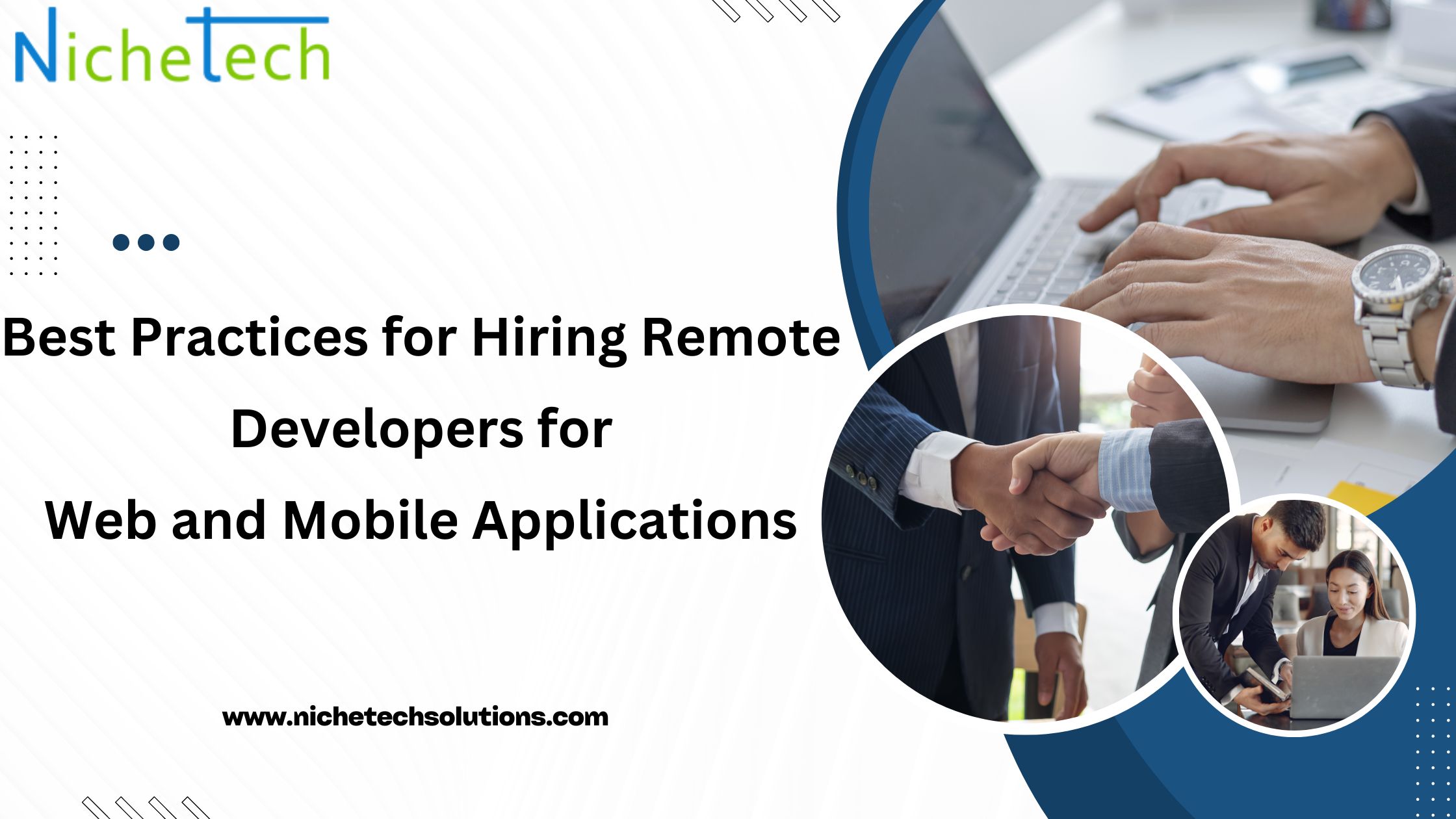The rise of remote work has transformed the hiring landscape, offering companies access to a global talent pool. For organizations developing web and mobile applications, hiring remote developers can be a strategic move to tap into diverse skills and expertise. However, successfully managing and hiring remote developers requires a thoughtful approach to ensure you find the right talent and integrate them effectively into your team. Here are some best practices to follow when hiring remote developers for web and mobile applications:
1. Define Clear Job Requirements and Expectations
Best Practice:
Detailed Job Descriptions: Craft detailed job descriptions outlining specific skills, technologies, and experience required for the role. Include responsibilities, project goals, and any technical requirements relevant to web or mobile development.
Project Scope and Deliverables: Clearly define the project scope, deliverables, and deadlines. This helps potential candidates understand the project’s complexity and their role within it.
Why It Matters:
A clear job description and project scope ensure that you attract candidates who have the right skills and are aware of what is expected of them. It also helps in setting realistic expectations and avoiding misunderstandings later in the hiring process.
2. Evaluate Technical Skills Through Practical Assessments
Best Practice:
Technical Assessments: Implement practical assessments or coding tests relevant to web or mobile development. This can include tasks like building a small application, fixing bugs, or solving specific problems related to your project.
Code Review: Ask candidates to share their previous work or contribute to a code review. This gives insights into their coding style, problem-solving abilities, and adherence to best practices.
Why It Matters:
Technical assessments help gauge a candidate’s actual skills and their ability to work on your specific technology stack. This practical evaluation is crucial to ensure that the developer’s skills align with your project requirements.
3. Assess Communication and Collaboration Skills
Best Practice:
Interview Communication: During interviews, assess candidates’ communication skills, including their ability to explain complex technical concepts in a clear and concise manner.
Remote Collaboration Tools: Evaluate their familiarity with remote collaboration tools like Slack, Zoom, or Asana. Effective use of these tools is essential for remote work success.
Why It Matters:
Good communication and collaboration skills are vital for remote work. Developers need to interact with team members, understand project requirements, and provide updates, often without face-to-face interactions.
4. Check for Cultural Fit and Adaptability
Best Practice:
Company Culture: Consider how well the candidate aligns with your company’s culture and values. A good cultural fit contributes to a harmonious team dynamic and better collaboration.
Adaptability: Evaluate the candidate’s ability to adapt to new tools, processes, and team dynamics. Remote work requires flexibility and the ability to adjust to different work environments.
Why It Matters:
A candidate who fits well with your company culture and can adapt to remote work environments is likely to be more engaged and productive. This helps in building a cohesive team and achieving project goals effectively.
5. Conduct Thorough Reference Checks
Best Practice:
Past Work References: Contact previous employers or clients to verify the candidate’s work history, performance, and reliability. Ask about their ability to meet deadlines, work collaboratively, and solve problems.
Project Feedback: Seek feedback on the candidate’s contributions to past projects, including their technical skills, work ethic, and ability to handle remote work challenges.
Why It Matters:
Reference checks provide valuable insights into a candidate’s work history and performance. This information helps validate the candidate’s skills and suitability for your project.
6. Implement Effective Onboarding Processes
Best Practice:
Structured Onboarding: Develop a structured onboarding process that includes an introduction to the team, project overview, and necessary tools and resources. Provide clear documentation and guidelines to help new remote developers get up to speed.
Mentorship and Support: Assign a mentor or point of contact to help new hires navigate the remote work environment and address any questions or concerns they may have.
Why It Matters:
Effective onboarding helps new remote developers integrate smoothly into the team and become productive quickly. It ensures they understand their role, project expectations, and how to collaborate effectively.
7. Establish Clear Communication Channels and Protocols
Best Practice:
Communication Tools: Set up and standardize communication tools and channels for regular updates, meetings, and collaboration. Ensure that everyone is familiar with these tools and protocols.
Regular Check-Ins: Schedule regular check-ins and team meetings to discuss progress, address issues, and provide feedback. This helps maintain alignment and fosters a sense of connection among remote team members.
Why It Matters:
Clear communication channels and regular check-ins are essential for remote teams to stay connected and aligned. This practice helps prevent misunderstandings, ensures that everyone is on the same page, and supports effective collaboration.
8. Monitor Performance and Provide Feedback
Best Practice:
Performance Metrics: Establish clear performance metrics and expectations for remote developers. Use these metrics to evaluate their work and provide constructive feedback.
Continuous Feedback: Offer regular feedback and support to help remote developers improve their performance and address any challenges they may be facing.
Why It Matters:
Monitoring performance and providing feedback helps ensure that remote developers stay on track and meet project goals. Regular feedback supports their professional growth and helps maintain high-quality work.
9. Foster a Strong Team Culture
Best Practice:
Team Building Activities: Organize virtual team-building activities and events to strengthen team relationships and foster a sense of camaraderie among remote developers.
Recognition and Rewards: Recognize and reward the contributions and achievements of remote developers. This can include public acknowledgments, bonuses, or other incentives.
Why It Matters:
Fostering a strong team culture helps remote developers feel valued and connected to the team. It enhances collaboration, boosts morale, and contributes to a positive and productive work environment.
10. Stay Compliant with Legal and Tax Requirements
Best Practice:
Legal Compliance: Ensure that you comply with legal requirements related to remote work, including employment laws, tax regulations, and labor practices in the developer’s location.
Contracts and Agreements: Use clear and comprehensive contracts that outline the terms of employment, project scope, payment terms, and intellectual property rights.
Why It Matters:
Compliance with legal and tax requirements helps avoid potential legal issues and ensures that your remote work arrangements are transparent and fair. Clear contracts protect both parties and clarify expectations.
Hiring remote developers for web and mobile applications offers numerous benefits, including access to a global talent pool and increased flexibility. By following these best practices, you can navigate the challenges of remote hiring and build a successful remote development team.
From defining clear job requirements to fostering a strong team culture, each step in the hiring process plays a crucial role in ensuring that remote developers contribute effectively to your projects. With careful planning, effective communication, and ongoing support, you can harness the power of remote talent and drive the success of your web and mobile applications.







